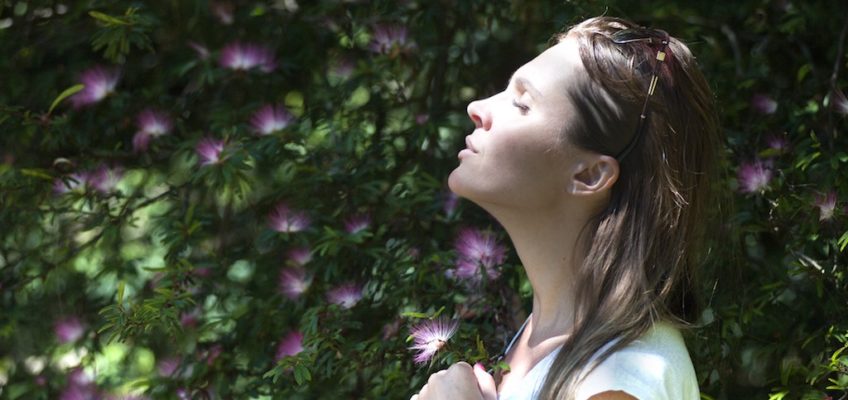We live in an age of anxiety. Few people would deny this. The question is Why? Why do worry and doubt so permeate our culture? Even more, can we combat it?
There is an antidote to anxiety, I believe. Underlying many issues of our time is the lost art of presence. Being here, fully present and aware in every moment, awakens our heart and mind.
When we engage the moment, worry, anxiety and fear become joy, peace, and hope.
If you think about a time when you experienced this shift, most likely it involved love or suffering. In my life, for example, I think about the day my wife and I exchanged vows. I think about the birth of my two sons. I also think about the sobering words from my doctor, “You have cancer” or the day our adoption agency informed us our daughter died.
In these moments, time stood still. The hands on the clock, much like life worries and stresses, became arbitrary. The present moment was all that mattered. And somehow, even if pain was involved, I realized the gift of being fully here.
Inevitably, however, my mind slipped back into default mode. Autopilot turned on, along with worry and stress. That is, until the next life event jolted me from my anxiety-ridden slumber.
So, how do we practice presence rather than waiting for the next encounter with love or suffering? How do we allow joy, peace and hope to become ways of life? Fortunately, no special knowledge or advanced degrees are required.
Here are a few ways to cultivate a life of presence and experience God.
1. Slow down.
Living in America, we’re behind the 8-ball here. Our economic engine runs on speed, efficiency, and productivity. While these values aren’t evil, they won’t help you experience God.
“Be still and know that I am God,” the Psalmist says. We mostly ignore verses like this because they’re not productive. They don’t solve a problem. It sounds more like laziness than experiencing God.
And maybe that’s the point.
2. Erase any line between sacred and secular.
I’ve known this reality for years. But as hard as I try, I can’t erase the line. For some reason, I believe God is more present at a weekend worship than my home on Tuesday night.
But I won’t give up trying. I know contentment and any lasting experience of God depends on seeing every moment as sacred. When you bring the same expectation to Monday night as Sunday morning, you’re more aware. You expect to see God in the mundane because life is your sanctuary.
3. See the world with curious eyes.
Wonder is hard to make sense of, like male cheerleaders and guys who go to BackStreet Boys concerts. I’m only joking about male cheerleaders.
Wonder requires curious eyes, a desire to learn and a willingness to wrestle with different rather than labeling it as wrong or evil. To wonder is to ask questions without seeking (or expecting) answers.
[ctt_hbox link=”T1edx” via=”yes” ]Our logic-driven culture is desperate for a little wonder.[/ctt_hbox]
Our logic-driven culture is desperate for a little wonder. It would do our anxious hearts some good.
4. Start with “yes” instead of “no.”
Richard Rohr says, “To start each encounter with ‘no’ is largely what it means to be unconscious or unaware.”
That’s strong.
Most of us begin with “no.” By that I mean we start by identifying what we don’t like, what’s wrong with a situation, or why this person is dangerous or risky. As Pastor Ray has mentioned before, “we build an identity around what we we’re against rather than what we’re for.” This creates a defensive posture and a pessimistic perspective of the world.
Starting with “yes” means affirming the goodness in everything and everyone. Think about people you dislike. What if you started with one positive, redemptive thought?
I’m not telling you to throw out the negative. I’m telling you not to start there.
This, I believe, is what made Jesus so radical. He saw the divine image in everyone, including the Pharisees, whom he scolded quite often. But even though Jesus spoke harshly to his enemies, he pleaded with God on the cross to forgive them.
Starting with “yes” increases your awareness and gives you eyes to see inherent goodness in God’s creation.
5. Wrestle with conflict and pain.
My boys are into board games. Their favorite? Candyland. What’s not to love. Ice cream, lollipops, and other sugary sweets pave the way to the Rainbow Castle. I mean, I love winning, but even I’m slightly disappointed when I reach the end before everyone else.
What does Candyland have to do with conflict or pain? Good question. I think we’re tempted to impose a Candyland perspective on the world, that somehow presence and joy and all that good stuff would come if the bad stuff went away.
You need to know that’s not true. Being present is NOT about avoiding the hard stuff or pretending disorder and injustice don’t exist.
Pain and suffering are all around. Part of experiencing God is accepting this reality. Rather than avoiding or medicating discomfort, we step into it.
[ctt_hbox link=”T1edx” via=”yes” ]We must train our eyes to see God in disorder and pain before our hearts will accept the present as a gift.[/ctt_hbox]
We must train our eyes to see God in disorder and pain before our hearts will accept the present as a gift.
Cultivating a life of presence might be simple, but it’s not easy. Fortunately, there is hope. Anxiety and its cousins – fear, worry, and despair – have no power over the present because God is there.
It’s your turn. What qualities or habits helps us practice presence? Leave a comment below.
Grace and peace, friends.


Colleen Tonkin
I just read again the story of Jesus eating Passover with his disciples and going to the Mt. of Olives to pray. Suddenly I was struck by the awareness that God’s perfect will for Jesus was going to be extremely difficult and painful. Jesus as a human did not want to face that anguish as he looked to the near future. But, in the “present” moment of the crucifixtion the most miraculous event took place. Jesus made it possible for every person to have eternal life and he entered fully into the presence of his Father.
To stay in the present moment is difficult because we mostly don’t want to be there or do what we are facing. What we can’t know is the outcome and what we imagine is or is not going to happen is probably not what God’s plan is for our lives.
As I sit in my bedroom writing this I am watching the sunrise and experiencing just for a few moments today the wonder and beauty of this moment. Funny thing is I can’t control it or have any effect on the sunrise. God is in complete control.
That might be what staying present is about.
Praise the name of Jesus!
Frank Powell
Colleen, love your transparency and passion. I agree totally with you about staying in the moment and not wanting to face the difficulties or boredom the moment brings. Well said. Blessings!
Bethany
Look again
God won’t always fix my problem. He might just change my perspective of it if I look again. To see a change I might have to stare through the situation. The enemy can’t destroy me but it will sure try and distract me, look again because the distraction isn’t the final round. His changing of my heart allows me to see so many things differently, more lovingly, peacefully, unafraid.
Peace to you
I enjoy your writing
Bethany
Frank Powell
Bethany, wise words here. Thanks for sharing.
Milanna Meyer
I would had gratitude to this list. Gratitude is positive and keep you present and brings you joy!